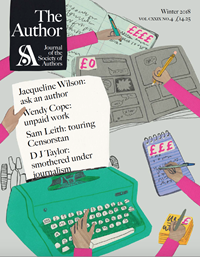 Entertainment as well as expertise
Entertainment as well as expertise
James McConnachie, Editor
Authors are producers. In traditional economic terms, our labour creates goods that we supply to a consumer – often in partnership with a publisher who provides capital and market access. Yet too often – and, it seems, increasingly – authors are becoming consumers.
We have long paid agents and indexers. The former are said to earn us more than the percentage they take as a fee. The latter perform a fairly technical task that many of us could not do half as well. It is reasonable and right to pay for professional services. What is not right is paying a gatekeeper in order to enter the market – especially when no gatekeeper is needed.
Vanity publishing has always been around. Oddly, in an age when self-publishing at minimal cost is ever more possible, there still seem to be companies that will take up to £20,000 from authors who believe that this fee will help them find readers. There are agents who charge ‘reading fees’, magazines that require a payment before you can submit work and poetry or fiction competitions that depend on entry fees. (Although as Simon Rae and Sarah Burton Kennedy explain in their articles, some such competitions are admirable.)
The other side of this economic coin, of course, is working for free. Our Chief Executive, Nicola Solomon, advises us how to deal with requests from charities, while Wendy Cope offers her own gloriously robust view. D. J. Taylor investigates how authors used to earn a living from journalism; now not just comment but also content can be free. Sam Leith and Jonathan Emmett, meanwhile, offer their different opinions on another controversial question: that of whether or not to boycott literary festivals in foreign states with suspect human rights records.
Sometimes the value authors bring to those who would employ them is more than just monetary. We need to consider that value. We also need to get on with earning actual money of course. So this issue features the highly successful self-publishers L. J. Ross and Ian Moore, who offer tips on how to maximise sales via Amazon.
 I am determined that every issue of The Author should offer inspiration as well as instruction. Entertainment as well as expertise. Contemplation as well as commerce. You will find all these qualities in Daniel Hahn’s glowing review of Philip Pullman’s Daemon Voices, in Aletta Stevens’ account of a chance encounter in Portugal and in Benjamin Myers’ thoughtful essay about writing during what you might call the difficult seasons.
I am determined that every issue of The Author should offer inspiration as well as instruction. Entertainment as well as expertise. Contemplation as well as commerce. You will find all these qualities in Daniel Hahn’s glowing review of Philip Pullman’s Daemon Voices, in Aletta Stevens’ account of a chance encounter in Portugal and in Benjamin Myers’ thoughtful essay about writing during what you might call the difficult seasons.
You will also find inspiration, I hope, in our short interview with children’s author and SoA stalwart Jacqueline Wilson. It is the first in a new series that is intended to open a window into the writing lives of some of our most respected and beloved members.
James McConnachie
mcconnachie.tumblr.com | @j_mcconnachie
Cover image by Tree Abraham, a Brooklyn-based book designer and artist from Canada. She almost always is paid for her creative work, but freely engages in many passion projects. www.treeabraham.com | @treexthree.
In this issue
FAIR PAY, FAIR PLAY
- Touring Censorstan by Sam Leith
- Think twice? By Jonathan Emmett
- Just give me a poem by Nicola Solomon
- Unpaid work by Wendy Cope
- In the poetry competition game by Simon Rae
- Out and about by Sarah Burton Kennedy
IN THE BUSINESS
- Charkin’s half century by Richard Charkin
- Tooling up with Amazon by L. J. Ross
- Amazon KDP: Moore’s laws by Ian Moore
- Smothered under journalism by D. J. Taylor
FEATURES
- Peot and tpyo by John Greening
- Writing for the seasons by Benjamin Myers
- Philip Pullman’s Daemon Voices by Daniel Hahn
- Chance encounter near Sintra by Aletta Stevens
REGULARS
- Need to know
- Ask an author by Jacqueline Wilson
- To the Editor
- Scriptwriting
- Booktrade news
- Notices
- Grub Street by Andrew Taylor